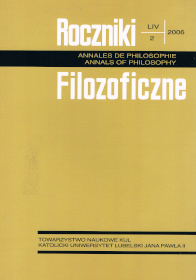Miejsce teorii względności w obszarze wiedzy ludzkiej
Abstrakt
The paper has outlined a broad perspective of references for the (particular and general) theory of relativity to various domains of human knowledge and to technique. These references are presented both in their current and historical dimension. The following issues are discussed: 1) the place of the theory of relativity in the development of physics and cosmology, 2) its contribution to the development of mathematics, 3) the significance of the theory of relativity in the development of technique, and 4) the role of the theory of relativity in the development of philosophy.
The theory of relativity is – aside to quantum mechanics – one of the two basic paradigms (relativistic paradigm) of contemporary physics. Likewise it plays a fundamental role in further development of physics, astronomy and cosmology, contributing at the same time to the development of mathematics and philosophy.
The author indicates that it is groundless to refer to the theory of relativity in the efforts to relativise and subjectivise cognitive and axiological questions. The theory of relativity does not relativise all its concepts of magnitudes, but it even confers the absolute status on certain magnitudes, which have been deemed relative before.
Bibliografia
Augustynek Z. (1970): Własności czasu, PWN, Warszawa.
Heller M. (1995): Szczęście w przestrzeniach Banacha, Wyd. Znak, Kraków.
Pais A. (2001): Pan Bóg jest wyrafinowny... Nauka i życie Alberta Einsteina, Prószyński i S-ka, Warszawa.
Penrose R. (1997): Makroświat, mikroświat i ludzki umysł, Prószyński i S-ka, Warszawa.
Raine D. J., Heller M. (1981): The Science of Space-Time, Pachart Publishing House, Tucson.
Such J. (2004): The Leibniz – Einstein Principle of the Minimization of Premises, [w:] J. Such, Multiformity of Science, Rodopi, Amsterdam–New York, s. 119-122.
Copyright (c) 2006 Roczniki Filozoficzne

Utwór dostępny jest na licencji Creative Commons Uznanie autorstwa – Użycie niekomercyjne – Bez utworów zależnych 4.0 Międzynarodowe.





